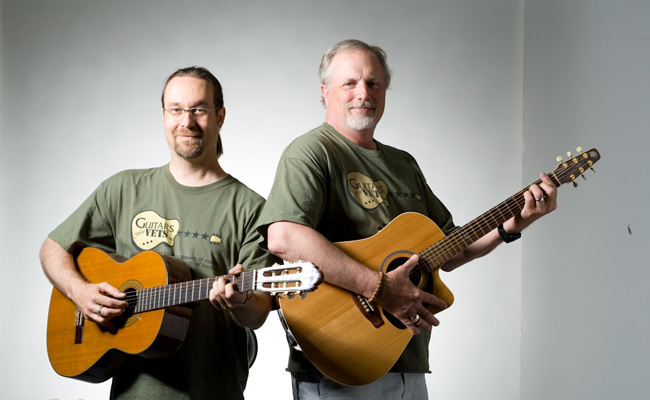In 2007, Patrick Nettesheim received a phone call that would change his and thousands of veterans' lives. It came from Vietnam-era veteran Dan Van Buskirk, who was searching for a guitar teacher.
Specifically, he needed someone to help him learn despite his difficulties with post-traumatic stress disorder (PTSD), which had kept him from starting lessons for years. Nettesheim took him in and felt the chemistry immediately. The call ultimately led to the formation of Guitars 4 Vets, a non-profit that provides relief to veterans with injuries, PTSD, and more.

Nettesheim's patience and acceptance made Van Buskirk comfortable. As a teacher, Nettesheim understands that each student's needs are different. To him, if someone wants to learn, they need to feel at home in a lesson—students should be able to confide in their teacher—and this attitude created an understanding and friendship between the two.
Van Buskirk soon saw progress with his PTSD and found playing guitar to be a productive coping mechanism. This led him to suggest that the two go and perform at The Clement J. Zablocki VA Medical Center for the spinal rehab department. Nettesheim agreed.
On the way to the performance, the two stopped at Cream City Music in Brookfield, Wisconsin. Inside, they ran into Joe Gallenberger, the store's owner and a son of a Korean War veteran. Understanding the trauma that could impact veterans, Gallenberger sympathized with their plans and gave them two guitars free of charge. It turned out to be a major butterfly effect.
"That's the big moment," Nettesheim says. "Otherwise Dan and I might have just played for those [veterans]."
The two ended up giving the two guitars away at the performance and teaching several patients how to play. In cases where the veterans had limited use of their limbs, Nettesheim and Van Buskirk would step in. They'd help form chord shapes or strum for them. Some patients were smiling more than they ever had since coming to the medical center.
The VA staff took notice. They approached Nettesheim and Van Buskirk to come back the next week, which they did. The two knew that they were onto something.
"Dan, I think we got something special here," Nettesheim recalls saying to Van Buskirk. "It's funny because I realized that as a musician, I'm already good at not making much money, so I thought, 'Why don't we start a nonprofit?'"
Since then, Guitars 4 Vets has grown to have over 130 chapters in several countries. It's given away 60,000 lessons and hosted 6,000 graduates. And according to Nettesheim, the rate of new chapters opening is increasing each year. Recent additions include ones in Wales and London. The organization also hosts cyber courses for veterans who aren't near a chapter location.
From the time they enter, each veteran is taken through a specialized multi-week program at their local chapter (often hosted in a Veterans Affairs facility). The volunteer teachers, some of which are graduates of the program, follow Nettesheim's PAGE philosophy—patience, acceptance, gratitude, and empathy—to ensure that each student receives the instruction they need. After completing the program, each graduate receives a Yamaha or Gibson guitar and an accessory kit.
Cream City Music's Joe Gallenberger gave them two guitars free of charge. It turned out to be a major butterfly effect.
Despite the success, Nettesheim stresses that Guitars 4 Vets needs more help from people outside the organization to "put fuel in the engine." For the organization to survive and grow, it needs four things: volunteers, instruments, awareness, and money.
To volunteer, anyone can visit the organization's site to find their local chapter and reach out to the coordinator. You can also help by finding a drop-off location and donating old guitars, some of which the organization sells in the Guitars 4 Vets Reverb shop. Every $200 spent there allows the organization to provide another veteran with an instrument. In addition, monetary donations can be made via its website.
With more resources, Guitars 4 Vets can continue its rapid growth. From the beginning, Nettesheim wanted the organization to be international so that it could reach as many veterans as possible.
"We have a philosophy in Guitars 4 Vets that when people say, 'I want to help, right here in my backyard,' we see our backyard as the United States," Nettesheim said. "And I'd like to say, eventually, that people will see the planet Earth as their backyard. It's all connected."
To learn more about the organization and find opportunities to help, visit the Guitars 4 Vets website or the Guitars 4 Vets Reverb shop.
